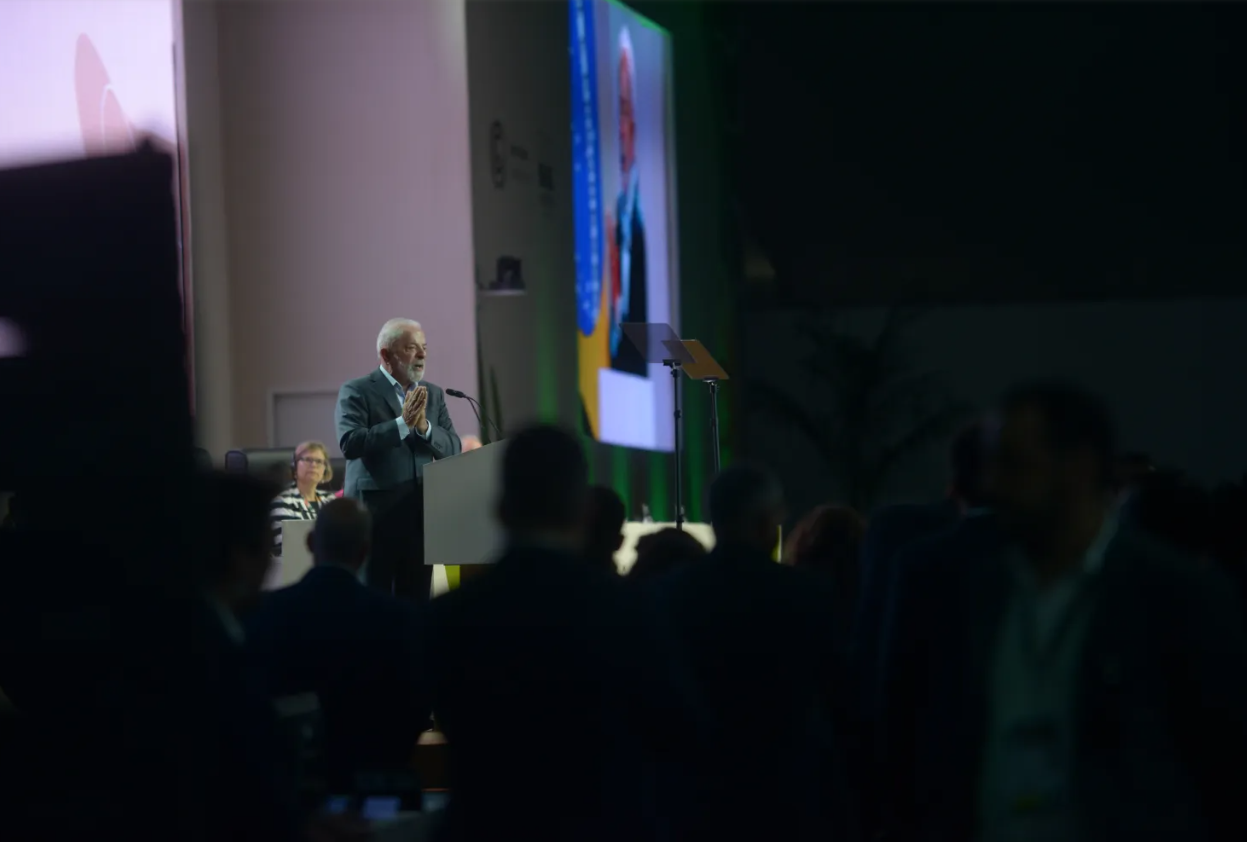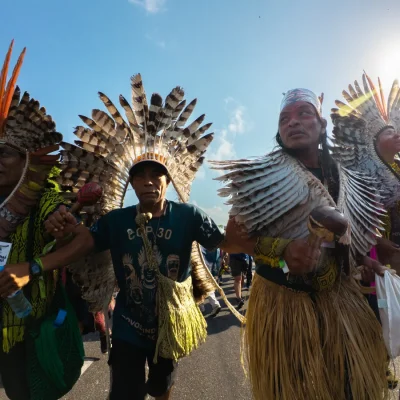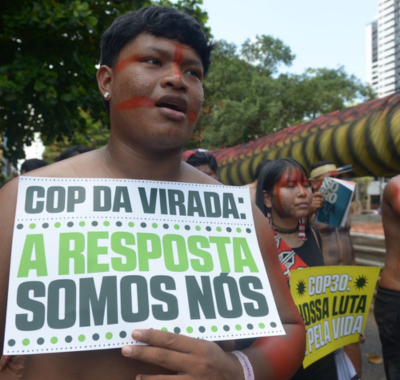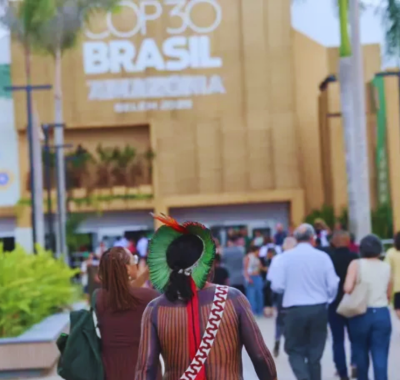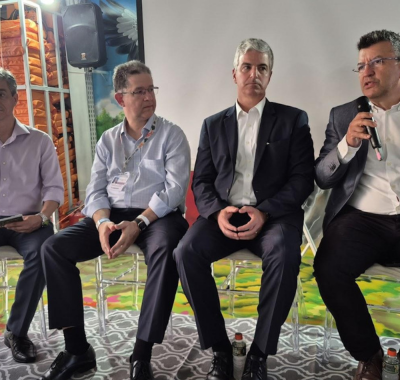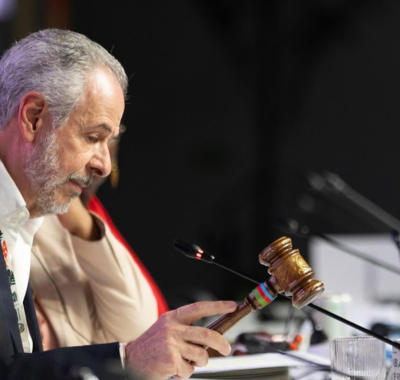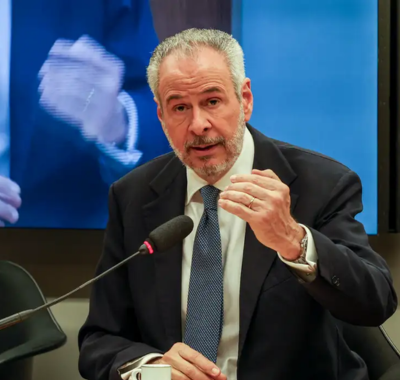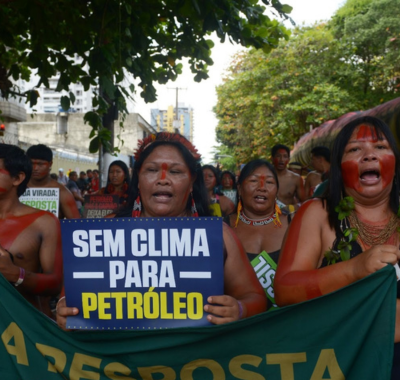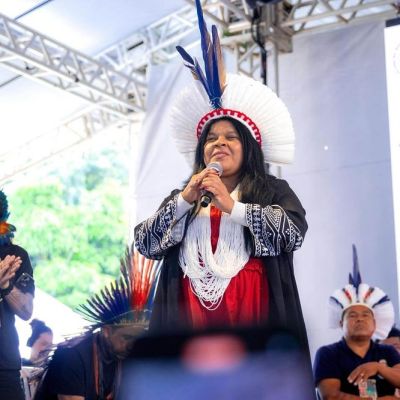InfoAmazonia summarizes the first week of the Conference, which began with the approval of the work agenda – still with four pending issues – and was followed by obstacles to setting adaptation indicators and by indigenous demonstrations at the entrance to the event. The week also saw the resumption of the Global Climate March after three COPs held in countries with restrictions on freedom of expression.
By Tais Gadea Lara
Translation: Roberto Cataldo/Verso Tradutores
“We want all countries to think about what they want as the outcome,” said the president of the 30th UN Conference on Climate Change (COP30), André Corrêa do Lago, at the press conference that closed the first week. The diplomat stressed that a “collective effort” will be needed to reach the expected results in the second and decisive phase of the climate negotiations.
COP30 officially began on Monday (10), in Belém, Brazil. The opening ceremony was attended by President Luiz Inácio Lula da Silva. “Without the Paris Agreement, the world would be facing catastrophic warming. We are moving in the right direction but at a very slow pace. At this rate, we won’t reach the 1.5°C limit,” he said.
The first week was marked by intense negotiation work, with some progress, a few obstacles and much still to be discussed for the necessary consensus. Before ministers arrive on Monday (17) for the political talks, here is a summary with five highlights of what has already happened at COP30.
Work agenda was approved, but four points were left out
Before the conference, delegates and civil society representatives agreed that approving the agenda could be one of the first challenges faced by COP30. The fact that this took almost two days during the preparatory meetings held in Bonn, in June, was enough to suggest that the scenario would be repeated in Belém. But that was not the case.
After an intense weekend of negotiations, the agenda with the points to be worked on was approved at the plenary session without major objections. However, four topics were left out and followed a “separate” path in the debates – precisely the most contentious ones, due to the disagreements between the countries.
These are:
- Article 9.1 of the Paris Agreement – on the responsibility of developed countries to mobilize financial resources for developing countries;
- Unilateral trade measures – such as taxes on carbon emissions from imported products;
- Biennial transparency reports;
- And the response to the third and most recent cycle of updated national climate plans –known as Nationally Determined Contributions (NDCs).
The initial discussions held in Bonn, in June, were stalled by the first two points.
While negotiations on the approved topics progressed, these four issues advanced together in informal consultations moderated by the COP30 presidency. Civil society representatives who followed the debates told InfoAmazonia that Article 9.1 was the focus and is still the main point of disagreement between developed and developing countries.
What will happen in the second week? That is uncertain. Corrêa do Lago said that a text summarizing the discussions will be published, and it will be up to the countries to decide what to do with it, since “this is a process led by the countries.” Only then will the presidency react.
Obstacles in adaptation and progress in just transition
Topics in the agenda approved included surprises – both positive and negative.
While Corrêa do Lago had told InfoAmazonia that he wanted COP30 to be remembered as the COP of adaptation, the discussions have not played in his favor. The group of African countries surprised the other delegations by asking for more time to set the indicators that will guide the implementation of the Global Goal on Adaptation – scheduled to be concluded in Belém. The reason for this request is the complexity of the indicators and dependence on funding for adaptation.
Related to this, discussions on increasing resource flows for adaptation are progressing slowly on other points of the agenda. Observers are optimistic that Belém may bring better results on this point than in setting the indicators, but they know that it will still not be a matter of negotiating a numerical value.
There were positive surprises in the Just Transition Work Program. The G77 (group that gathers developing and underdeveloped countries) drew attention by supporting the creation of a mechanism to implement a more inclusive transition, both socially and environmentally. That is a favorable first step, but there is still much to be discussed, especially because its application in different sectors may result in disagreements between countries.
“This proposal marks the starting point for serious negotiations on the safeguards and systems needed to prevent climate action from accidentally pushing people into poverty,” said Teresa Anderson, Global Lead on Climate Justice at ActionAid International. “Countries are finally talking seriously about how workers, women and communities can influence climate plans to ensure that their lives improve rather than worsening.”
Everyone speaks of a roadmap to move away from fossil fuels, but…
In June, Brazil’s Minister of the Environment and Climate Change Marina Silva was the first to mention the creation of a roadmap for the transition away from fossil fuels.
In Belém, she stressed the idea again, and President Lula himself included the topic in his speech to heads of state: “We need roadmaps so that humankind, in a fair and planned way, overcomes dependence on fossil fuels, stops and reverses deforestation, and mobilizes funds for these purposes.”
Optimism surrounding the possibility of making progress on an issue responsible for 90% of global CO2 emissions resonated in the corridors of COP30. But Corrêa do Lago remained cautious: “This is not a topic on the negotiation agenda.” For him, this path is directly linked to the commitments that each country makes through its NDCs.
Denmark, Colombia, Kenya, France, and the Marshall Islands are reportedly supporting the roadmap. It remains to be seen whether it will appear in the second week, in the final text of the cover decision – that is, of course, if COP30 ends with a cover decision.
Few follow the financing route
As part of the new climate finance target set in Baku in 2024 – which left most developing countries dissatisfied – Azerbaijan and Brazil, as the presidencies of COP29 and COP30, drafted a Baku-Belém Roadmap report to scale up funding to 1.3 trillion US dollars.
The document was presented shortly before the conference and received criticism from experts for focusing on actors and initiatives that circumvent the responsibility of developed countries to mobilize public resources. It also raised concerns about its practicality, as it is a compilation of non-binding actions and recommendations.
The first week ended with an event in which, after 40 minutes of repetition of the content already present in the report, the presidencies heard comments mainly from some delegates and other actors.
Kenya’s special climate envoy Ali Mohamed suggested that the short-term recommendations be incorporated into the COP30 decision. A delegate from Colombia, representing the AILAC group, criticized the report for confusing actions to support developing countries with the transformation of all financial flows. She called for the creation of space to discuss what will actually be carried forward in the negotiation process.
Without directly responding to the requests, Corrêa do Lago was clear in clarifying that only the 300-billion-dollar mobilization target is part of the formal negotiations. “The Roadmap report is a living document. It has a special status, since it is not a text negotiated and officially approved by countries. This allows it to be updated and improved.”
Sandra Guzmán, director of the Climate Finance Group for Latin America and the Caribbean, criticized the low participation in the event and expressed concern that the increase in funding will end up being restricted to the document. “Without Brazil’s political will to promote proper talks, it’s very difficult for countries to really be interested in moving forward with the Roadmap,” she told InfoAmazonia. “No country is really defending the roadmap, and that’s because of how the whole process was conducted and the elements it contains.”
________________________________________
Indigenous people made their protests resonate inside and outside the event
On Tuesday night (11), the highlight was a demonstration by some indigenous communities together with other activists. They tried to enter the conference venue and were stopped by security personnel from the UN and the Brazilian government.
On Thursday morning (13), members of the Munduruku indigenous community protested peacefully at the entrance to the event. Corrêa do Lago went out to talk to them, who asked for a meeting with President Lula to demand an end to extractive activities in the Amazon, such as mining and oil exploration. Do Lago said he explained that the topics discussed at the conference also benefit indigenous communities.
After three years in which restrictions on freedom of expression at COP27 (Egypt), COP28 (United Arab Emirates), and COP29 (Azerbaijan) prevented the traditional Global Climate March, on Saturday (15), several organizations, indigenous communities and residents took to the streets of Belém in a festive atmosphere with a strong call for an end to fossil fuels. More than 70,000 people participated in one of more than 100 protests held in 27 countries.
“The Global Climate March represents the strength of social participation that gives life to COP30. In addition, it sends a clear message to the conference negotiators: there can be no just transition without considering the peoples and territories that already suffer from the effects of the climate emergency on a daily basis,” said Leilane Reis, Climate Justice Coordinator at Greenpeace Brazil.
This report was produced by InfoAmazonia, through the Collaborative Socio-environmental Coverage of COP 30. Read the original report at: https://infoamazonia.org/2025/11/16/financiamento-adaptacao-e-protestos-o-que-marcou-a-primeira-semana-da-cop30/

